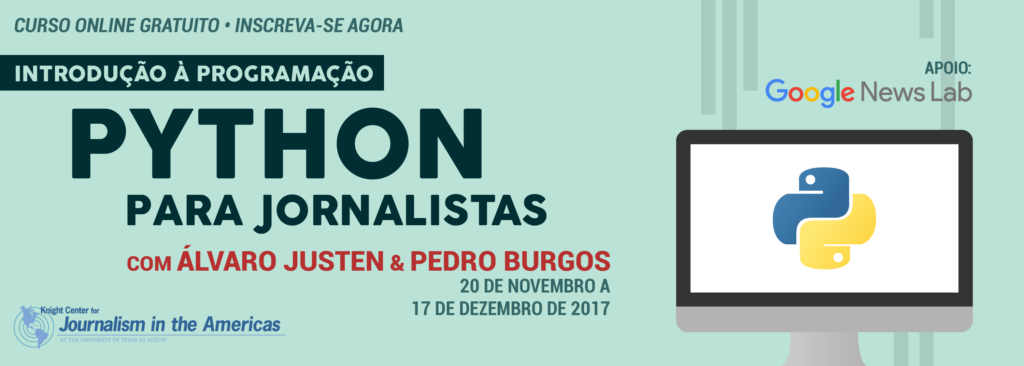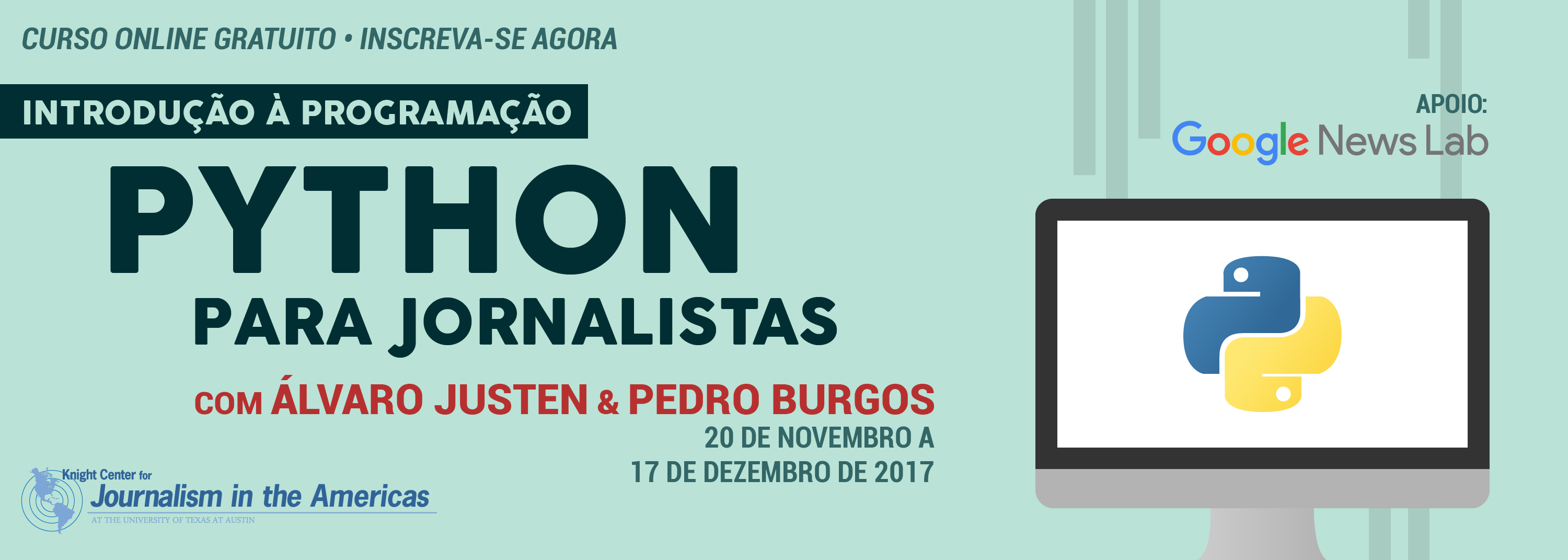
Analyzing massive databases or thousands of scattered documents, structuring information from web pages, identifying text patterns in official documents. These are more and more frequent demands in journalistic work that, without automated routines, can be laborious or even impossible to execute.
The new online course in Portuguese offered by the Knight Center, thanks to the generous support from Google News Lab, will teach how to create programs in Python, one of the most popular programming languages in the world. The goal is to resolve recurring problems that journalists face, especially when working with digitized data. Register now to guarantee your spot in the course.

There are no prerequisites to participate in the course, which has been designed to help journalists that want to start programming, even if they are not professional programmers. The skill is increasingly in-demand in newsrooms around the world where journalists and programmers coexist.
In four weeks – from Nov. 20 to Dec. 17 – participants will learn programming logic and will better understand how software, databases and the internet itself works, along with instructors Álvaro Justen and Pedro Burgos.
Álvaro Justen is a veteran programmer of the Python community in Brazil, activist and collaborator of free software projects since 2004. He currently works to capture, clean and analyze data in diverse journalistic projects. He is the director of courses at la Escola de Dados (School of Data) in Brazil.
Pedro Burgos is a journalist and since 2015, has been the developer and founder of Impacto.jor, an initiative to measure journalism’s impact in society. He has a Master’s degree in Social Journalism from the City University of New York and was an visiting researcher at Columbia University in 2017. He worked in radio, print and magazines before becoming editor-in-chief of the technology site Gizmodo Brasil.
“This course was designed for journalists, so the examples we use are based on the difficulties they usually face on a daily basis,” Justen explained. “In addition, we bring several practical exercises so the course participants can create their own programs and automate repetitive tasks.”
Burgos also pointed to the direction of the course as something differential. “For example, in the first week, we show how to use variables and basic Python operations to calculate how much something costs in the ‘Geddel apartments’ [referring to the Brazilian politician investigated in the Lava Jato case],” he said. “There are dozens of excellent online courses that teach basic programming, but I think that by focusing on journalistic examples, it will be easier for the students to see what they have learned, no ‘Hello World’ here.”
Each week will bring a different approach: in the first, the focus will be on the principles of programming logic and the fundamental concepts of programming in Python, like variables and decision commands. Then, the students will see how the information is organized on computers and online databases. In the last two weeks, they will learn to develop small codes that perform predetermined tasks and will build an automated program to scrape data from the internet.
“If you search Google for the definition of journalism, the first result talks about ‘collection and analysis of current information.’ I can see programming fitting perfectly in that definition,” Burgos emphasized. “A person who knows how to write a program is able to gather more information, investigate a large amount of data and train a program to analyze the information, in addition to creating robots to automate its transmission. That is to say: the connection between programming and journalism has always been there.”
The participants will be encouraged to create practical projects with the knowledge acquired in the course, and the best projects will compete for ten scholarships to participate in a face-to-face seminar with the instructors at the Google Brazil headquarters in São Paulo. All those who qualify for a certificate of completion (that is, complete the mandatory activities in the four modules) will be able to participate. Those selected from outside São Paulo will have airfare and accommodation costs covered. The details of the contest will be announced during the MOOC.
As with all Knight Center courses, the instructors will present their lessons through video classes, and participants will also have access to presentations, lectures, discussion forums and weekly quizzes. The MOOC is asynchronous, meaning there are no live activities, students can participate and complete practice activities throughout the week at their own pace. However, there will be weekly deadlines for each module.
The course is intended for journalists, but is open to anyone interested in starting their programming knowledge in Python. There are no prerequisites nor is it necessary to have previous experience with programming. Participants will only need a stable internet connection to access the weekly modules.
The course is free, but whoever wishes to receive a certificate of completion must comply with the requirements, request the certificate and pay an administrative fee of $30 using an international credit card. The certificate will be issued only for students who actively participate in the course and complete the quizzes and exercises proposed. The document can be downloaded in PDF format after the Knight Center checks whether the course requirements have been met, and has no formal academic credit attached.
“This will be the fifth course this year offered by the Knight Center thanks to the support of the Google News Lab,” said Professor Rosental Alves, founder and director of the Knight Center. “We are grateful and proud for this partnership that has made it possible to democratize free access to state-of-the-art journalism training for thousands of people who would have no other way to receive this kind of training.”
The Knight Center for Journalism in the Americas was created in 2002 by Professor Rosental Alves, holder of the Knight Chair in Journalism at the University of Texas School of Journalism in Austin, thanks to generous donations from the John S. and James L. Knight Foundation. The Knight Center’s distance learning program began in 2012 and is the only one in the world to offer open and massive online courses specializing in journalism. In five years, the initiative has already benefited more than 115,000 people from more than 170 countries.

Knight Center for Journalism in the Americas
300 West Dean Keeton
Room 3.212
Austin, TX, 78712
Phone: 512-471-1391
Email: journalismcourses@austin.utexas.edu